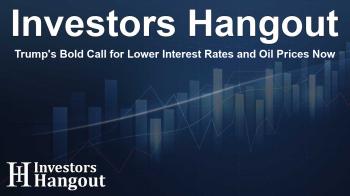Trump's Bold Call for Lower Interest Rates and Oil Prices Now

Trump's Ambitious Economic Agenda
In the early days of his presidency, Donald Trump launched a significant declaration: he aims to command the Federal Reserve to lower interest rates. In his address at an international economic forum, he made it clear he would demand immediate action.
Demanding Changes
During a virtual appearance, Trump stated, "I’ll demand that interest rates drop immediately." This assertive statement came alongside his request for Saudi Arabia's intervention to decrease oil prices, signaling a multifaceted approach to economic management.
Link Between Oil and Interest Rates
Trump emphasized that reducing oil prices would serve as a catalyst for lowering interest rates. He stated, "With oil prices going down, I’ll demand that interest rates drop immediately." This link between lower oil costs and reduced borrowing rates reflects topical economic priorities.
The Reality of Influencing Markets
While this strategy may seem bold, it raises questions about feasibility. The complexities of global market dynamics mean that a president’s influence over interest rates and oil prices is limited. Trump's assertions come in a context where both financial metrics are influenced by various international factors, such as supply and demand dynamics and economic health across multiple nations.
Understanding Interest Rates
The Federal Reserve plays a pivotal role in determining interest rates. Although Trump could theoretically attempt to influence the Fed's actions, such a pursuit would require monumental changes in how the central banking system operates.
Rumor has it that one of Trump’s potential moves could involve dismissing current Fed Chairman Jerome Powell, who has reiterated that he cannot be removed at the president's whim. However, if Congress collaborated with Trump, fundamental changes to the Federal Reserve's governance could occur, but this remains a complicated and uncertain scenario.
A Thought Experiment on Monetary Control
Let’s entertain the notion that Trump could indeed gain power over how interest rates are set. Even if that were the case, it wouldn’t directly affect long-term interest rates, which don’t necessarily respond uniformly to adjustments in the Federal Funds Rate.
For instance, following previous attempts to adjust rates, the 10-year Treasury yield showed a contrary trend by rising, highlighting the challenge of predicting market reactions to federal adjustments.
Challenges with Oil Pricing
Shifting gears to the oil market, you find Trump potentially facing another uphill battle. Although Saudi Arabia holds a significant position in the global oil market as one of the largest producers, the kingdom's willingness to align with Trump's requests remains under scrutiny.
History of Presidential Influence
Trump is not unique among presidents in seeking to sway monetary and oil policies. Historical precedents exist, where past leaders also extended pressures on Federal Reserve officials and oil-producing nations. For example, President Nixon famously encouraged the expansion of the money supply for political purposes leading up to the 1972 election, with mixed results.
The Power of Markets
Ultimately, the crux of the matter lies within the power of market forces. Efforts by politicians to override these forces often yield unfavorable outcomes. The intrinsic path of price discovery in global markets, driven by economic fundamentals, tends to remain impervious to political machinations over time.
Frequently Asked Questions
What prompted Trump to demand lower interest rates?
Trump believes that lowering interest rates would stimulate economic growth and lower costs for borrowing, particularly in association with declining oil prices.
Can the president directly influence Fed rates?
While the president can suggest changes, the Federal Reserve operates independently, and any direct influence would require significant legal changes.
Why are oil prices linked to interest rates?
Oil prices affect inflation and consumer expenses, which in turn influence economic conditions impacting interest rates set by the Federal Reserve.
What are the challenges in managing oil prices?
Oil prices are dictated by supply and demand on a global scale, and a single nation’s influence can be limited, even for a heavyweight like Saudi Arabia.
How have past presidents navigated economic pressures?
Presidents have historically pressured the Fed and oil producers but have often faced challenges due to market realities and established economic principles.
About The Author
Contact Kelly Martin privately here. Or send an email with ATTN: Kelly Martin as the subject to contact@investorshangout.com.
About Investors Hangout
Investors Hangout is a leading online stock forum for financial discussion and learning, offering a wide range of free tools and resources. It draws in traders of all levels, who exchange market knowledge, investigate trading tactics, and keep an eye on industry developments in real time. Featuring financial articles, stock message boards, quotes, charts, company profiles, and live news updates. Through cooperative learning and a wealth of informational resources, it helps users from novices creating their first portfolios to experts honing their techniques. Join Investors Hangout today: https://investorshangout.com/
The content of this article is based on factual, publicly available information and does not represent legal, financial, or investment advice. Investors Hangout does not offer financial advice, and the author is not a licensed financial advisor. Consult a qualified advisor before making any financial or investment decisions based on this article. This article should not be considered advice to purchase, sell, or hold any securities or other investments. If any of the material provided here is inaccurate, please contact us for corrections.

